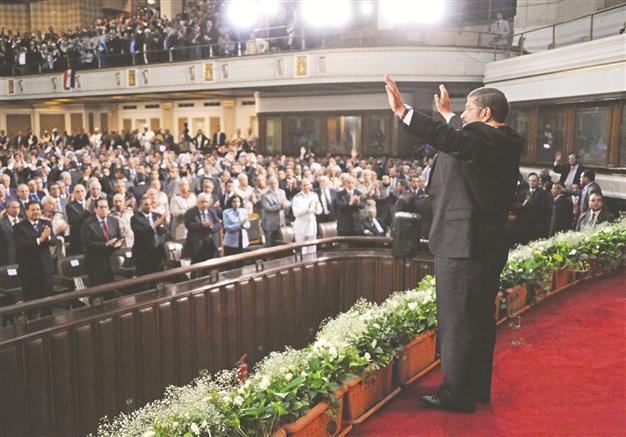Iran, Egypt look toward historic thaw
CAIRO / TEHRAN

Egyptian President Mohamed Morsi waves following his inaugural address at Cairo University, after being sworn-in at the Constitutional Court in the capital, to become the country’s first freely elected leader. AFP photo
In the first sign of warming relations between two regional powers, Iranian President Mahmoud Ahmadinejad called his Egyptian counterpart, Mohamed Morsi, on July 4 to wish the Muslim Brotherhood politician success. At first glance, it might seem like a normal call between two countries’ presidents, but it is actually much more significant than this.The call appears to be the first contact between the two leaders since Morsi was sworn in as president of Egypt, a country which has not had diplomatic relations with Tehran for 30 years. Egypt is a predominantly Sunni Muslim country, while in Iran most of the population belongs to the Shiite branch of Islam. Ahmadinejad invited Morsi to attend a summit of the Non-Aligned Movement (NAM), scheduled to be held in Tehran on Aug. 29, the state news agency said, quoting Morsi’s spokesman. Egypt currently holds the NAM’s rotating presidency and Iran is expected to assume it next month. According to the protocol, the Egyptian president should personally hand over his chair to the incoming president.
Ties between Cairo and Tehran, which does not recognize Israel, were severed in 1980 following Egyptian President Anwar Sadat’s decision to accept peace with Israel following the 1978 Camp David Accords and the 1979 signing of a formal Egypt-Israel peace treaty.
Ayatollah Ruhollah Khomeini, leader of the 1979 Iranian Revolution which saw the overthrow of Mohammad Reza Pahlavi, denounced Sadat’s decision, labeling it “treason against Islam,” and called on the Egyptian people to overthrow his government.
The Islamic republic was further aggravated by Egypt’s decision to host the deposed shah of Iran. Relations between the two countries reached a low point in the 1980s, when Egypt supported Iraq in its war against Iran. Further warming signals have been revealed recently by the statements of a top Iranian diplomat. Iranian Foreign Minister Ali Akbar Salehi said Iran was ready to upgrade its relations with Egypt to the level of “ambassador,” whenever the Arab country announces its readiness.
Fears of Gulf countries
“Iran has always expressed its interest in upgrading political relations between Tehran and Cairo to the level of ambassador, and whenever the Egyptian side is ready, the Islamic Republic of Iran is ready to enhance ties between the two countries,” the Tehran Times quoted Salehi as saying. Salehi described current relations between Iran and Egypt as “good.”
“The election of Morsi to serve as the Egyptian president has opened a new chapter in the country’s foreign policy.” On the other hand, political analysts emphasized the necessity of Gulf countries establishing strong ties with the “new Egypt” against the rising influence of Shiite Iran in the region and preventing it from interfering in Arab affairs. Arab political analyst Abdullah al-Nafeesi said Egypt will require the support of neighboring countries amid domestic problems.
“If we don’t support them, Iran will do so and we will therefore be allowing it to interfere in Arab affairs,” al-Nafeesi said, adding that he thought the most important thing was to keep Iran and Egypt apart. “This will only happen if we befriend the new Egyptian regime, but if some of our officials antagonize the Brotherhood or the president, this will offer a golden opportunity for Iran to step in. That is why we have to make sure we forge an alliance with Egypt, an Arab and Sunni nation, to counter Iranian influence,” al-Arabiya website quoted al-Nafeesi as saying.
Iran, al-Nafeesi said, has already shown its face in several countries in the region like Syria and Yemen, and Gulf nations should make sure this is not repeated with Egypt. Mohamed al-Sheikh, political writer at Egypt’s al-Hayat newspaper, thinks a future alliance between Egypt and Iran is quite unlikely, especially with the Muslim Brotherhood in power.
“Morsi is allied with the Salafis and those have grave concerns about Shiites. Iran is also not on good terms with the Gulf nations with which Egypt wants to establish strong ties in the coming phase.” Iran’s support for the Syrian regime, he added, makes it hard for the Brotherhood to enter into such an alliance. Being close to Iran, al-Sheikh said, would also embarrass the Brotherhood with the West, which is an unwanted risk at the moment.
















